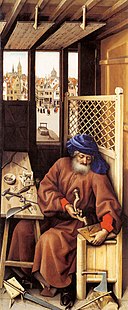The Devil exulted when Christ died, and by that very death of Christ the Devil was overcome: he took food, as it were, from a trap. He gloated over the death as if he were appointed a deputy of death; that in which he rejoiced became a prison for him. The cross of our Lord became a trap for the Devil; the death of the Lord was the food by which he was ensnared.
This passage, from one of St. Augustine's Ascension sermons, has had an interesting history. The translation above, which I take it is Sister Mary Sarah Muldowney's, is a very sober translation, but you can easily translate this more flamboyantly. The word for 'trap' here is muscipula, which literally means a mousetrap. And the image of the Cross as a mousetrap for the devil, the theme of muscipula diaboli, crux Christi, is one that you find in a number of places. One of the more famous is the Mérode Altarpiece, which has St. Joseph making mousetraps while the Annunciation is going on (you can click through for a better view):

In reality, while the word does literally and etymologically mean 'mousetrap', it had become a very common word for all kinds of traps. If you read a lot of Augustine, you know that he usually doesn't invent things like this, although he will sometimes employ them creativity; the image actually comes from Scripture. The Latin of the Psalter Augustine knew uses muscipula a lot for any kind of hunting snare; for instance, in Psalm 124:7 (or 123:7 in the old numbering) it is used for a bird-snare: "We have escaped like a bird from the fowler’s snare; the snare has been broken, and we have escaped." It's the common Scriptural image of the wicked laying a snare for others; and as in Psalm 9:16, it is sometimes presented as the wicked falling into their own snare. And this, of course, is something like Augustine's idea, which he mentions explicitly earlier in the sermon:
But if He had not been put to death, death would have not died. The Devil was overcome by his own trophy, for the Devil rejoiced when, by seducing the first man, he cast him into death. By seducing the first man, he killed him; by killing the last Man, he lost the first from his snare.
Probably the most accurate translation for it would be 'pitfall', i.e., a trap consisting of a baited hole in the ground; Adam is thrown into the pit (death) and throwing Adam into the pit (bringing death upon humanity) leads to throwing Christ into the pit (Christ as man also dies on the Cross); but Christ rises and ascends out of the pit (Resurrection and Ascension), bringing Adam with him. And because of it, the Devil himself is toppled into a pit (hell, the second death) because he was greedy for the bait (death for all human beings, which includes Christ).
But the mousetrap makes for a very vivid image.